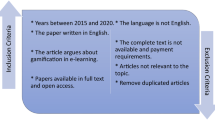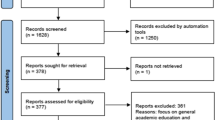Abstract
The real-life training of people with learning difficulties is a highly challenging and demanding process that can be effectively improved with the deployment of special-purpose software instruments. This paper discusses the development and evaluation of two inclusive training applications and two games for people with learning difficulties. Namely, the four developed systems are: (a) a cashier training applications; (b) a sewing training applications; (c) an accessible pong game; and (d) an accessible action game. The main objective of the work was to investigate the hypothesis that computer games, as pleasant, motivating and highly engaging interactive experiences, can have a significant role on improving the training of people with learning difficulties, such as attention deficit disorder or Asperger syndrome. The obtained results are very positive and encouraging, and have led to the identification of new research directions, blending training and playing, via novel training techniques and purpose-specific game genres.














Similar content being viewed by others
Notes
http://www.seriousgames.org/
http://www.ldanatl.org/aboutld/parents/ld_basics/ld.asp
http://www3.who.int/icf/icftemplate.cfm
http://www.ldanatl.org/aboutld/resources/frames.asp?top.asp+http://www.smartkidswithld.org
References
Benedek, J., Miner, T.: Measuring desirability: new methods for evaluating desirability in a usability lab setting. In: Proceedings of Usability Professionals Association, Orlando, 8–12 July 2002
Day,S.L., Edwards, B.J.: Assistive technology for postsecondary students with learning disabilities. J. Learn. Disabil. 29(5), 486–492 (1996)
Denis, G., Jouvelot, P.: Motivation-driven educational game design: applying best practices to music education. In: ACM SIGCHI International Conference on Advances in Computer Entertainment (ACE 2005), Valencia, Spain, 15–17 June 2005
Digiplay Some key gaming facts. Retrieved September 14, 2004, from Digiplay Web Site: http://www.digiplay.org.uk/facts.php
Game Accessibility special interest group (GA-SIG). “Accessibility in games: motivations and approaches”, electronically available at: http://www.igda.org/accessibility/IGDA_Accessibility_WhitePaper.pdf (2004)
Grammenos, D., Savidis, A., Stephanidis, C.: The development of a sensory system for intelligent game creatures. In: 11th International Conference on Human-Computer Interaction (HCI International 2005). LEA, CD-ROM. Las Vegas, USA, 22–27 July (2005a)
Giguette, R.: Pre-games: games designed to introduce CS1 and CS2 programming assignments. ACM. SIGCSE. 35(1), 288–292 (2003)
Klin, A., Volkmar, vF.R., Sparrow, S.S., Cicchetti, D.V., Rourke, B.P.: Validity and neuropsychological characterization of Asperger syndrome: convergence with nonverbal learning disabilities syndrome. J. Child. Psychol. Psychiatry 36(7), 1127–1140 (1995)
Pieper, M., Morasch, H., Piéla, G.: Bridging the educational divide. Universal Access Infor. Soc.. 2(3), 243–254 (2003)
Prensky, M.: Digital Game-Based Learning. McGraw-Hill (2000)
Savidis, A., Grammenos, D., Stephanidis, C.: Developing inclusive e-learning systems. Universal Access in the Information Society, special issue on “Information Technology Systems Accessibility”, 5(1), 51–72 (2006, to appear)
Savidis, A., Vernardos, G., Stephanidis, A.: Embedding scanning techniques accessible to motor-impaired users in the WINDOWS object library. In: Design of Computing Systems: Cognitive Considerations (21A). Salvendy, G., Smith, M., Koubek, R. (eds.) pp. 429–432 Elsevier (1997)
Screendigest : Press release: video games market demonstrates over 100 percent growth. In: Six Years, London Retrieved September 14, 2004, from Screendigest Web Site: http://www.screendigest.com/reports/ils04/press_releases_31_08_2004n/view
Sedighian, K.: Challenge-driven learning: a model for children’s multimedia mathematics learning environments. ED-MEDIA 97: world conference on educational multimedia and hypermedia. Calgary, Canada (1997)
Stephanidis, C., Salvendy, G., Akoumianakis, D., Bevan, N., Brewer, J., Emiliani, P.L., Galetsas, A., Haataja, S., Iakovidis, I., Jacko, J., Jenkins, P., Karshmer, A., Korn, P., Marcus, A., Murphy, H., Stary, C., Vanderheiden, G., Weber, G., Ziegler, J.: Towards an information society for all: an international R&D agenda. Int. J. Hum. Comput. Interact. 10(2), 107–134 (1998) [On-line]: Available at: http://www.ics.forth.gr/hci/files/white_paper_1998.pdf
Verenikina, I., Harris, P., Lysaght, P.: Child’s play: computer games, theories of play and children’s development. In: Wright, J., McDougall, A., Murnane, J., Lowe, J. (eds.) Proceedings of the Young Children and Learning Technologies. Selected papers from the international federation for information processing working group 3.5 open conference, Conferences in Research and Practice in Information Technology, vol. 34 ACS 99 Melbourne, Australia (2003)
Acknowledgments
The King Pong and Access Invaders entertainment applications have been mainly developed in the context of the MICOLE project (IST-2003-511592 STP), partly funded by the Information Society Technologies Programme of the European Commission DG Information Society. The partners in the MICOLE consortium are: University of Tampere (Finland); University of Glasgow (UK); University of Metz (France); Uppsala University (Sweden), Lund University (Sweden); Royal Institute of Technology KTH (Sweden); Siauliai University (Lithuania); Institute of Computer Science FORTH (Greece); University of Linx (Austria); University of Pierre and Marie Curie (France); France Telecom (France); Reachin Technologies AB (Sweden). The cashier and sew-trainer training applications have been developed and are deployed under a sub-contract (2001) from the “Centre of Special Training”, of the “Therapeutic Clinic of Lifelong Diseases”, located at the city of Agios Nikolaos, Region of Crete.
Author information
Authors and Affiliations
Corresponding author
Rights and permissions
About this article
Cite this article
Savidis, A., Grammenos, D. & Stephanidis, C. Developing inclusive e-learning and e-entertainment to effectively accommodate learning difficulties. Univ Access Inf Soc 5, 401–419 (2007). https://doi.org/10.1007/s10209-006-0059-3
Published:
Issue Date:
DOI: https://doi.org/10.1007/s10209-006-0059-3




